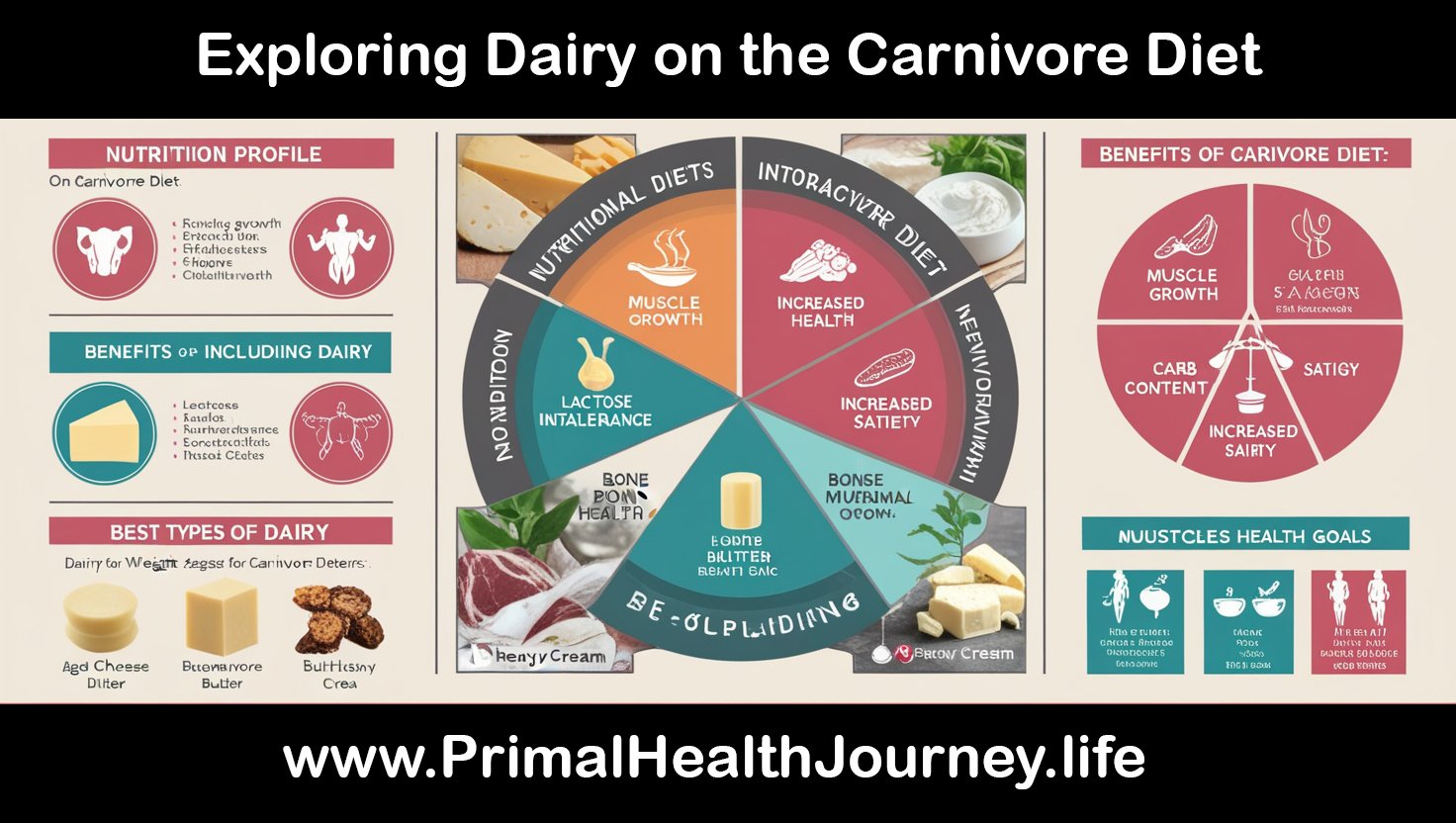Dairy products have a controversial standing within the carnivore diet community. While they provide additional nutrients and flavors, they can also pose challenges for some individuals. Understanding how to effectively incorporate dairy into a carnivore diet is essential for maximizing its health benefits while minimizing potential risks.
Nutritional Profile of Dairy in a Carnivore Diet
Dairy products are rich in various nutrients that can complement a meat-based diet:
- Proteins: Dairy is an excellent source of high-quality protein, which is essential for muscle growth and repair.
- Fats: Full-fat dairy options provide healthy fats that are crucial for energy, especially in a low-carb dietary framework.
- Vitamins: Dairy is rich in vitamins such as vitamin A (important for vision and immune function), vitamin D (for bone health), and B vitamins (for energy metabolism).
- Minerals: Calcium and phosphorus in dairy support bone health, while magnesium aids in muscle function and energy production.
Benefits of Including Dairy
1. Muscle Growth
The high protein content in dairy can support muscle growth and recovery. Consuming protein-rich foods post-workout can enhance muscle protein synthesis, making dairy an excellent addition to post-exercise meals.
2. Bone Health
Dairy products are well-known for their calcium content, which is vital for maintaining strong bones and preventing osteoporosis. The combination of calcium with vitamin D found in fortified dairy products further enhances bone health.
3. Satiety Benefits
Dairy can increase feelings of fullness due to its fat and protein content. This satiety can help individuals on the carnivore diet manage their appetite more effectively, potentially leading to reduced overall calorie intake.
Drawbacks and Risks of Dairy
1. Lactose Intolerance
Many individuals experience lactose intolerance, which can lead to digestive discomfort such as bloating, gas, and diarrhea when consuming dairy products. It’s essential to assess personal tolerance levels before incorporating dairy into your diet.
2. Hormonal Concerns
Some studies suggest that dairy consumption may influence hormone levels due to its content of hormones naturally present in milk or those added during processing. This can potentially affect insulin sensitivity and overall hormonal balance .
3. Carb Content
While many dairy products are low in carbohydrates, some options like milk contain lactose—a sugar that can contribute to carbohydrate intake. For those strictly adhering to a low-carb or ketogenic approach within the carnivore diet, it’s crucial to choose low-lactose options.
Best Types of Dairy for Carnivore Dieters
When incorporating dairy into a carnivore diet, opt for low-lactose options that provide maximum benefits with minimal drawbacks:
- Aged Cheese: Hard cheeses like cheddar or parmesan are lower in lactose compared to soft cheeses.
- Butter: High in fat and low in lactose, butter can be used liberally in cooking or as a spread.
- Heavy Cream: Ideal for adding richness to meals without significant carbs; it can also be used in coffee or recipes.
Dairy for Different Health Goals
Weight Loss vs. Muscle Building
- Weight Loss: For those aiming to lose weight on the carnivore diet, moderation is key when it comes to dairy. While it provides satiety, excessive consumption may lead to unwanted calorie intake.
- Muscle Building: If the goal is muscle development, including adequate amounts of high-protein dairy products like Greek yogurt or cottage cheese can complement protein intake from meats.
Scientific Perspectives and Studies on Dairy
Research on dairy’s effects within a carnivore diet context is limited but growing. Studies have shown mixed results regarding dairy’s impact on metabolic health:
- A study published in The American Journal of Clinical Nutrition indicated that full-fat dairy consumption may be associated with improved metabolic markers compared to low-fat options .
- Conversely, some research suggests that high dairy intake could lead to increased inflammation in certain individuals.
These findings highlight the need for personalized approaches when incorporating dairy into dietary regimens.
Conclusion and Recommendations
Incorporating dairy and transitioning to the carnivore diet can provide numerous benefits but also presents certain challenges. To safely and effectively integrate dairy:
- Start with small amounts to assess tolerance.
- Focus on low-lactose options like aged cheese, butter, and heavy cream.
- Monitor your body’s response to determine what works best for your health goals.
Ultimately, whether you choose to include dairy should depend on your individual health needs and dietary preferences. By understanding both the benefits and drawbacks of dairy consumption within the carnivore framework, you can make informed choices that support your overall well-being. This article provides a comprehensive overview of the role of dairy within the carnivore diet while addressing both its potential benefits and risks based on current understanding and scientific perspectives.


